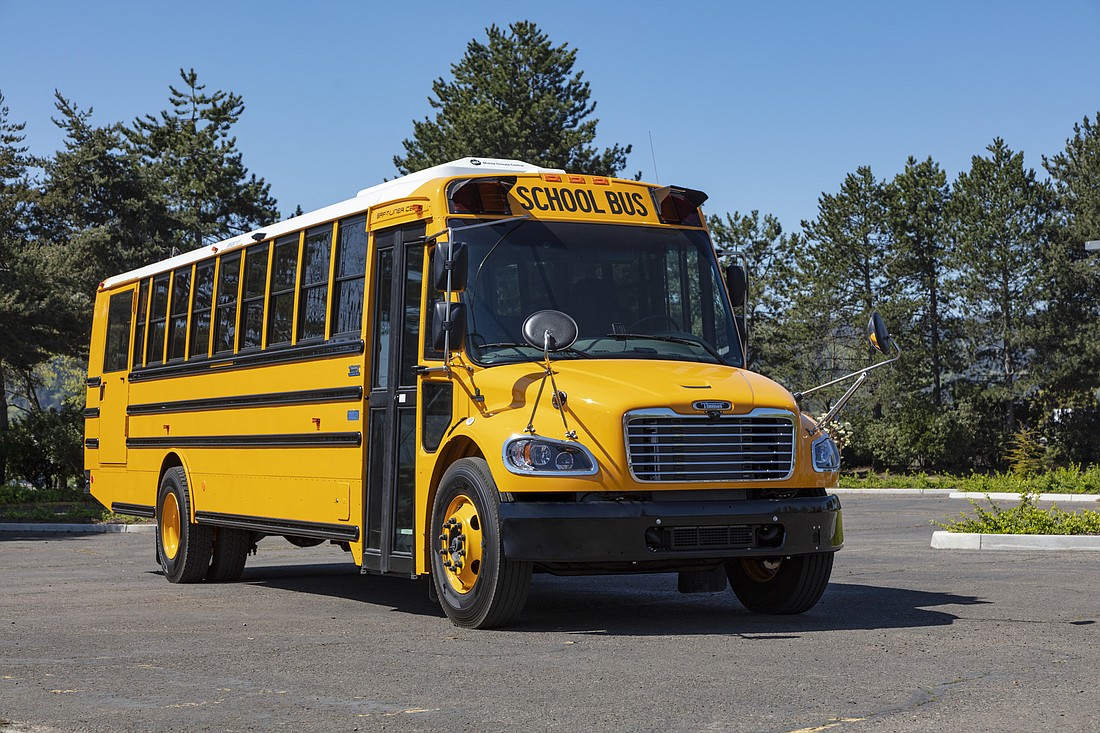- December 26, 2024
-
-
Loading

Loading

For the price of 12 new diesel-powered buses, Sarasota County Schools over the next four years will take delivery of a dozen new electric buses through the help of a Florida Department of Environmental Protection grant.
The school district expects to take delivery of the first three battery-run buses by the early part of the 2022-23 school year. Three new buses will arrive each subsequent year until the 12-bus order is completed.
As part of the requirements of the grant, the fleet's oldest diesel buses will be scrapped as the electric ones arrive. The DEP grant will pay $236,746 for each bus, leaving the district to pay the equivalent of a new diesel bus, about $120,000.
All told, the deal is worth $4.28 million to the county, with the district paying $1.4 million. Beyond the grant's price reduction, school district officials are looking for potential efficiencies in fuel savings and maintenance-cost reductions.
And then there's the environment, said Jason Harris, the director of Sarasota County Schools' transportation division.
"It's part of our strategic plan to have efficient and effective operations through fiscal stewardship,'' he said. "As far as the transit side, California has been very successful with that and that has now moved into the school bus realm. We are are happy to take advantage of the grant and implement that sustainability here in Sarasota.''
Sarasota is among 23 other counties in Florida — including Manatee County, which announced it will be purchasing three to five electric buses upon board approval — chosen to take part in the statewide grant program. According to DEP, $116 million has been set aside for a range of electric buses from the state's share of settlement money derived from a federal lawsuit involving Volkswagen. In total, Volkswagen paid nearly $3 billion into a nationwide mitigation fund after it was found the car-maker dodged federal emissions standards with about a half-million cars sold to the public. Florida Power & Light is working with the school district to install charging stations at the district's transportation base in Osprey.
In Florida, the 23 counties are broken into five urbanized areas around Pensacola, Jacksonville, east and west Central Florida and South Florida.
The electric buses chosen by Sarasota County Schools will be built by Thomas, a manufacturer of school buses across the decades. The Jouley model — a physics play on words based on the term for a unit of energy — looks and acts like a standard diesel bus and is built on a standard bus chassis. It's yellow. It has a folding door in front. It has a seating capacity of 77.
But on the road, while no specialized training will be required for drivers, the experience will be unlike a typical school bus ride.
"As far as driving goes, it's a bus,'' Harris said. "The bus is so quiet that it almost like we have to put something over just to make some noise. It's very, very quiet.
In its sales materials, Thomas touts the quiet as a safety feature, helping drivers hear better what's going on inside the cabin and out.
The model Sarasota chose can expect to drive about 125-150 miles on a charge, which makes an electric bus ideal inside city limits or in an environment of more concentrated bus stops, Harris said. Electric vehicles incrementally recharge their batteries while coasting or braking. Stretches of uninterrupted driving interfere with that function, cutting range.
Sarasota will launch its electric buses along with several other counties with plans to compare notes on performance to better understand their optimum use. Fuel savings and maintenance savings are given, Harris said, but the operational numbers are still a bit of a mystery until the buses are humming up and down Tamiami Trail.
"Our plan is to look at it for the first year, and then we'll get the next three and then we'll get the next three,'' Harris said. "We'll collect all of that data and we'll be watching that and analyzing that over the years, just to come to get that number, to find out if it truly is more efficient."
Harris said the school district's plan to accept delivery of three electric buses a year for four years was also designed to possibly take advantage in upgrades in years to come.
"Yes, there's the possibility that the technology is going to improve over the next couple years,'' he said. "So our electric buses, possibility is there for them to become even more efficient. We know that technology is evolving and what we get now, or what we get in our first order, may not be as advanced as what we receive in our last order.''